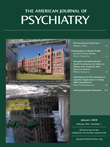Dr. Rush Replies
Drs. Keitner, Solomon, and Ryan raise three important issues: 1) the limitations of current treatments in not producing sustained remission in a substantial number of depressed patients; 2) the undisputed importance of improving psychosocial function and quality of life for all depressed patients; and 3) the potential downside of medication combinations or other “complex treatment regimens.”
Since STAR*D did not evaluate all available treatments for depression, we cannot conclude that the 33% who did not reach remission after four treatment steps would not have benefited from other medications, psychotherapies, or somatic treatments. Furthermore, even at the fourth treatment step, a small but meaningful (8%–14%) number of participants achieved remission. Thus, the decision to scale back the goals of treatment to less than remission seems unwise until at least four treatment attempts. On the other hand, some patients may well be unable to reach and sustain remission. Clinicians must decide when to no longer pursue remission as the goal of treatment by making further treatment changes. However, patients who partially benefit from medication may further improve their well-being and quality of life when psychosocial interventions or other rehabilitative efforts are put in place (1, 2). On the other hand, given the undisputed advantage of remission, both functionally and prognostically continued efforts may well be worthwhile in selected patients. The decision to switch from remission to improved quality of life should be a collaborative one between patient and doctor. Indeed, efforts to improve function and quality of life, as noted by Dr. Keitner et al., can readily become part of the treatment regimen for all patients (remitted or not) and may be provided along with additional efforts to achieve remission.
Whether “more complex regimens” (i.e., medication combinations) are more burdensome, risky, or effective is an empirical question that deserves study. Many psychiatrists now use combination medications, but few controlled trials have actually evaluated this practice. Some studies (3, 4) do suggest better efficacy and little additional side-effect burden for selected combinations. Whole sale polypharmacy is not to be recommended. Carefully conducted randomized trials pitting monotherapy against drug combinations are needed to directly assess whether both acute and longer-term outcomes can be enhanced without undue patient burden.
1. Schatzberg AF, Rush AJ, Arnow BA, Banks PL, Blalock JA, Borian FE, Howland R, Klein DN, Kocsis JH, Kornstein SG, Manber R, Markowitz JC, Miller I, Ninan PT, Rothbaum BO, Thase ME, Trivedi MH, Keller MB: Chronic depression: medication (nefazodone) or psychotherapy (CBASP) is effective when the other is not. Arch Gen Psychiatry 2005; 62:513–520Google Scholar
2. Rush AJ, Trivedi MH, Wisniewski SR, Nierenberg AA, Stewart JW, Warden D, Niedereche G, Thase ME, Lavori PW, Lebowitz BD, McGrath PJ, Rosenbaum JF, Sackeim HA, Kupfer DJ, Luther J, Fava M: Acute and longer-term outcomes in depressed outpatients requiring one or several treatment steps: a STAR*D report. Am J Psychiatry 2006; 163:1905–1917Google Scholar
3. Blier P, Tremblay PM, Ward HE, Herbert C, Bergeron R: Antidepressant drug combination from treatment initiation to improve therapeutic response to major depression, in Proceedings of the 18th European College of Neuropsychopharmacology Congress. Amsterdam, ECNP, 2005Google Scholar
4. Carpenter LL, Yasmin S, Price LH: A double-blind, placebo-controlled study of antidepressant augmentation with mirtazapine. Biol Psychiatry 2002; 51:183–188Google Scholar



